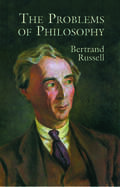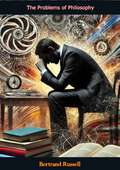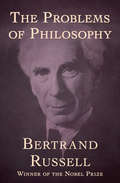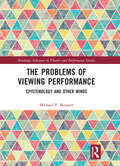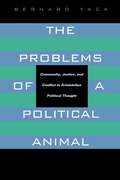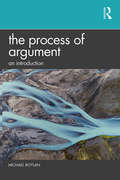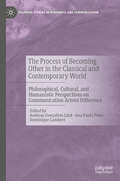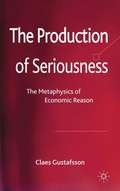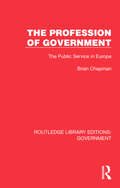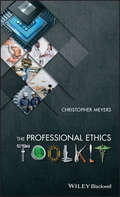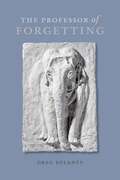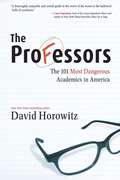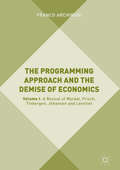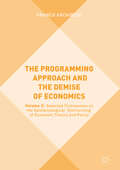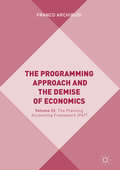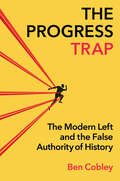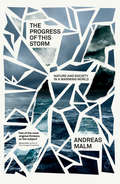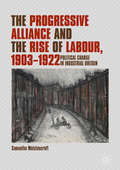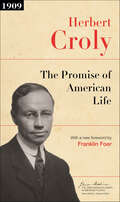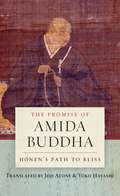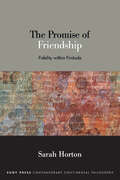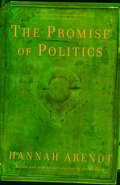- Table View
- List View
The Problems of Philosophy
by Bertrand RussellThe Problems of Philosophy' discusses Bertrand Russell's views on philosophy and the problems that arise in the field. Russell's views focus on knowledge rather than the metaphysical realm of philosophy. 'The Problems with Philosophy' revolves around the central question that Russell asks in his opening line of Chapter 1 - Is there any knowledge in the world which is so certain that no reasonable man could doubt it? He examines this question by delving into the idea of reality versus appearance, as for Russell and other philosophers who share his ideas it is sensory perception of the world around them that shapes their knowledge. It is in this work that he discusses his idea of sense-data to help explain the differences between appearance and reality. 'The Problems of Philosophy' is Russell's first attempt at recording and working through a theory of epistemology, which is the theory of the nature of human knowledge.
The Problems of Philosophy
by Bertrand RussellDive into the foundational questions of philosophy with Bertrand Russell's The Problems of Philosophy. This classic work, penned by one of the 20th century's most influential philosophers, provides an accessible and thought-provoking introduction to philosophical inquiry.Bertrand Russell, a renowned philosopher, logician, and Nobel laureate, examines some of the most enduring problems in philosophy, presenting them in a clear and engaging manner. Russell explores fundamental questions about the nature of reality, knowledge, and the limits of human understanding. Russell's lucid writing and keen analytical skills make complex philosophical concepts approachable for readers of all backgrounds.In this seminal text, Russell addresses key topics such as the distinction between appearance and reality, the existence and nature of matter, the theory of knowledge, and the problem of induction. He also delves into the nature of truth and falsehood, the limits of philosophical knowledge, and the relationship between philosophy and science.Russell's exploration is not merely theoretical; he provides concrete examples and practical applications of philosophical ideas, demonstrating their relevance to everyday life. His balanced approach combines rigorous analysis with a deep appreciation for the wonder and curiosity that drive philosophical inquiry.The Problems of Philosophy is an essential read for students of philosophy, educators, and anyone interested in deepening their understanding of the world. Russell's insightful and compelling treatment of philosophical issues invites readers to think critically about the nature of reality and our place within it.Join Bertrand Russell on a journey through the key questions that have shaped philosophical thought for centuries. The Problems of Philosophy remains a timeless and influential work, offering readers a profound and accessible guide to the enduring questions of human existence.
The Problems of Philosophy: Large Print (Barnes And Noble Library Of Essential Reading Ser.)
by Bertrand RussellBertrand Russell&’s classic primer on Western philosophy and the greatest thinkers of the past three millennia With zest and rigor, Bertrand Russell applies twentieth-century thinking to age-old philosophy, from the works of Plato and Aristotle to those of René Descartes and John Locke. In The Problems of Philosophy, he reviews the Western canon&’s most influential ideas and thought experiments, offering a comprehensive and enlightening text for curious and seasoned philosophy readers alike. Infused with Russell&’s own observations and critiques, this study offers reviews of topics such as idealism, knowledge, and the natures of truth, reality, and existence. Including the author&’s prominent thinking on knowledge by acquaintance versus knowledge by description, The Problems of Philosophy is a critical look at the major philosophical accomplishments spanning from classical Greece to the twentieth century. This ebook has been professionally proofread to ensure accuracy and readability on all devices.
The Problems of Viewing Performance: Epistemology and Other Minds (Routledge Advances in Theatre & Performance Studies)
by Michael Y. BennettThe Problems of Viewing Performance challenges long-held assumptions by considering the ways in which knowledge is received by more than a single audience member, and breaks new ground by, counterintuitively, claiming that viewing performance is not a shared experience. Given that viewers come to each performance with differing amounts and types of knowledge, they each make different assumptions as to how the performance will unfold. Often modified by other viewers and often after the performance event, knowledge of performance is made more accurate by superimposing the experiences and justified beliefs of multiple viewers. These differences in the viewing experience make knowledge surrounding a performance intersubjective. Ultimately, this book explains the how and the why audience members have different viewing experiences. The Problems of Viewing Performance is important reading for theatre and performance students, scholars and practitioners, as it unpacks the dynamics of spectatorship and explores how audiences work.
The Problems of a Political Animal: Community, Justice, and Conflict in Aristotelian Political Thought
by Bernard YackA bold new interpretation of Aristotelian thought is central to Bernard Yack's provocative new book. He shows that for Aristotle, community is a conflict-ridden fact of everyday life, as well as an ideal of social harmony and integration. From political justice and the rule of law to class struggle and moral conflict, Yack maintains that Aristotle intended to explain the conditions of everyday political life, not just, as most commentators assume, to represent the hypothetical achievements of an idealistic "best regime."By showing how Aristotelian ideas can provide new insight into our own political life, Yack makes a valuable contribution to contemporary discourse and debate. His work will excite interest among a wide range of social, moral, and political theorists.
The Process of Argument: An Introduction
by Michael BoylanThe Process of Argument: An Introduction is a necessary companion for anyone seeking to engage in successful persuasion: To organize, construct, and communicate arguments. It is both comprehensive and accessible: An authoritative guide to logical thinking and effective communication. The book begins with techniques to improve reading comprehension, including guides on navigating through fake news and internet trolls. Then, readers are taught how to reconstruct deductive, inductive, and abductive presentations so that the logical structure is explicit. And finally, there is a step-by-step guide for responding to these texts via the argumentative essay. Along the way are current examples from social media and elsewhere on the internet along with guides for assessing truth claims in an ever-complicated community worldview. Throughout, are carefully selected reading questions and exercises that will pace readers in order to ensure that the text is securely grasped and successfully applied. Key Features Offers guidance on how to read a text through self-analysis and social criticism Provides a step-by-step procedure for allowing the student to move from reading to reconstruction to being prepared to write an effective argumentative essay Presents truth theory and shows readers how they can helpfully acquaint themselves with a version of realistic, foundational epistemology Offers guidelines and helpful tools on how best to structure an argumentative, pro or con, essay Includes expansive coverage of inductive logic through the use and assessment of statistics Covers abductive logic as it applies to the analysis of narrative in argumentative writing Has up-to-date examples from the media, including from blogs, social media, and television Includes a helpful glossary of all important terms in the book
The Process of Becoming Other in the Classical and Contemporary World: Philosophical, Cultural, and Humanistic Perspectives on Communication Across Difference (Palgrave Studies in Otherness and Communication)
by Andreas Gonçalves Lind Ana Paula Pinto Dominique LambertThis book considers communication across difference in a variety of humanistic contexts, from classical Greek literature, to continental philosophy, environmental studies, media studies, science and technology studies, animal studies, and beyond. With contributors from all around the globe (including Portugual, South Africa, Turkiye, China, Italy, and other countries), this volume provides a truly diverse range of perspectives on the philosophical and practical dimensions of communicating across otherness and difference.
The Production of Seriousness
by Claes GustafssonThis book is about the roots of managerial rationality. A theoretical base, founded on the concept of 'memetics' is developed in order to explain human thinking and human reason as products of cultural evolution. Cultural change and development are explained by simple, value-driven memetic mechanisms like 'ritualization' and 'extremization'.
The Profession of Government: The Public Service in Europe (Routledge Library Editions: Government)
by Brian ChapmanOriginally published in 1959, and using material collected from eight languages, much of which was previously unpublished, this is a genuine comparative study, not merely describing each country separately, but an analysis of the most important questions facing 20th century public administration. A substantial historical introduction traces from Roman to modern times the concept and practice of public service and brings out the underlying unity of European experience.
The Professional Ethics Toolkit
by Christopher MeyersThe Professional Ethics Toolkit by Christopher Meyers
The Professor of Forgetting
by Greg DelantyThe Professor of Forgetting, a new collection from the acclaimed Irish poet Greg Delanty, swings back and forth on the fulcrum of what we call “now” and confronts our notion of how time passes. From the very first poem, “Going Nowhere Fast,” which ponders whether we are now here or going nowhere, to the final selection, from which the book takes its self-reflective title, these exuberant poems chronicle what it means to be human with joy, pathos, honesty, despair, sorrow, celebration, and wit. Structurally diverse in form, the poems also explore a range of poignant topics, including childhood, family, love, racism, the natural world, immigration, and the unavoidability of death. Often humorous, Delanty’s poetry finds ways of coping with the challenges of life, as it makes lasting art out of heartbreaking difficulty and experience.
The Professors: The 101 Most Dangerous Academics in America
by David HorowitzBeware the unhinged, leftist academic when David Horowitz hits campus. This book is a thoroughly enjoyable and useful guide to the worst of the worst in the hallowed halls of academia. There are those who would politicize the university classroom and transform it into an advocacy center for narrow and extreme views. If we allow that to continue, we will undermine America's ability to lead in the century ahead. This is the story of almost any campus in America. Parents know college professors 'tend to be liberal' but they don't realize how truly anti-middle class and anti-American they can be. The Professors is a must-read, not only for educators and governmental policy makers-but for every parent with high school or college-age children.The professors throws light on the political abuse of our college and university classrooms by activist professors who have been enabled to do so because of the incestuous self-selection process for faculty recruitment and tenure. The book also throws a harrowing light on the decline of professional standards in our schools and the efforts by faculty with political agendas to use their classrooms for indoctrination rather than education. With documentation that will be hard to refute, David Horowitz describes the betrayal of our young people by professors who are defiantly unethical and contemptuous of academic standards. Academics on the Left like to pat themselves on the back for daring to 'speak truth to power.' The Professors speaks some uncomfortable truths to them-to those who run American higher education today. They will hate this scathing critique, but will be hard- pressed to answer his charges.
The Professors: The 101 Most Dangerous Academics in America
by David HorowitzBestselling author David Horowitz reveals a shocking and perverse culture of academics who are poisoning the minds of today's college students. The Professors is a wake-up call to all those who assume that a college education is sans hatred of America and the American military and support for America's terrorist enemies.
The Profile of a Wise Man
by Swami SuddhanadaSwamiji unfolds many facets of Wisdom like petals of a flower. Wisdom does not lie in searching for a wise man. Wisdom is when you stop blaming others for your problems. Wisdom is when we stop having double standards. Wisdom is becoming happiness. Wisdom is not searching for happiness in other things. A scientist in one who challenges the perception. If doubting the perception is the beginning of science, doubting the perceiver - I the individual, is the beginning of wisdom. Swamiji also explodes many common myths convincingly with sheer directness. Engineers do not know engineering, those who know engineering are engineers. You have a limitation but you are not limited. The body has no fear; body does not know; it has no sense of 'I'. A thought reminds you of the object but does not produce the object. The relevance of knowledge is facing life, not in keeping ideas in your head. Anytime you are with yourself you are happy. Whenever you are happy: unconsciously you are with yourself.
The Programming Approach and the Demise of Economics: Volume I: A Revival of Myrdal, Frisch, Tinbergen, Johansen and Leontief
by Franco ArchibugiIn this book – the first of three volumes – Franco Archibugi sets out to create an epistemology of economics, arguing for a radical overturning of the conventional analysis from a “positive” approach to a “programming” approach. This overturning leads to a reappraisal of the foundations of Economics itself, and to an improved integration of Economics as an autonomous discipline alongside Sociology, Political Science, Operational Research, Social Engineering and Physical or Spatial Planning.The author interrogates how scientific the social sciences really are before proposing a new scientific paradigm for the social sciences, a political preference function and a general programming approach. The chapters revisit hitherto neglected economists like Gunnar Myrdal, Ragnar Frisch, Vassili Leontief, and Leif Johansen, using their theory to overturn the epistemological approach of the entire science of economics.Volume II explores oppositions to the traditional and conventional teaching of economics, whilst Volume III presents a concrete and practical example of how to build a Planning Accounting Framework (PAF), as associated with Frisch’s ‘plan-frame’ (explored in Volume II), to demonstrate the extent to which decisions and negotiations can be routed in the social sciences.
The Programming Approach and the Demise of Economics: Volume II: Selected Testimonies on the Epistemological 'Overturning' of Economic Theory and Policy
by Franco ArchibugiThis trilogy deals with an epistemology of economics, arguing for a radical overturning of conventional analysis and providing an alternative to political economy and social sciences, based not on positivism, but on a normative and programming paradigm. Volume II builds on the work presented in Volume I to explore oppositions to the traditional and conventional teaching of economics, and presents testimonies that are favourable to a trend towards a programming approach, thereby giving substance to the epistemological 'overturning' of conventional analysis. Such oppositions studied include the work of Ludvig von Mises and his theory of praxeology; Ian Tinbergen and Wassily Leontif's preference for 'planning' over 'forecasting science'; Bruno de Finetti and Daniel Bell's support for the base of 'utopia' in economics; the trend from the 'theory of planning' towards the 'methodology of planning, by Andreas Faludi; neoclassic curiosity about the 'multi-purposes approach' and 'non-economic commodities' as investigated by Walter Isard, as well as theories expressed by Herbert Simon, Robert Lucas, George Soros and Mark Blaug. Volume III takes studies further and presents a concrete and practical example of how to build a Planning Accounting Framework (PAF), as associated with Frisch's 'plan-frame' (explored in Volume II), to demonstrate the extent to which decisions and negotiations can be routed in the social sciences.
The Programming Approach and the Demise of Economics: Volume III: The Planning Accounting Framework (PAF)
by Franco ArchibugiThis trilogy deals with an epistemology of economics, arguing for a radical overturning of conventional analysis and providing an alternative to political economy and social sciences, based not on positivism, but on a normative and programming paradigm. Volume III furthers and concludes work presented in Volume I and Volume II, and introduces a concrete and practical example of how to build a Planning Accounting Framework (PAF), as associated with Frisch's 'plan-frame' (explored in Volume II), to demonstrate the extent to which decisions and negotiations can be routed in the social sciences. The PAF is an instrument of the programming approach that can be used to verify the compatibility of decisions and their effects. The author builds on Frisch's classical PAF to maximise the phenomenology of economic systems, and assure a consistent and effective implementation of decision making.
The Progress Trap: The Modern Left and the False Authority of History
by Ben CobleyThe idea of progress, one of the animating ideas of Western civilization, has now gone global. From Marxism and neoliberalism to today’s mutant identity politics, it offers a framework of knowledge and confidence: an assurance that things will get better and that history is on our side. However, in doing this it creates a form of authority that is simultaneously imaginary and dishonest, resting on confidence in a future that is really contingent and unknowable. In The Progress Trap, Ben Cobley looks at this progressive mindset as a form of power, conferring a right to act and control others. ‘Change’, ‘transformation’ and the ‘new’ are the superior values, meaning destruction of the old: people, cultures and nature. It is a trap into which nearly all of us fall at times, so attractive are its stories and familiar its techniques. Hard-hitting but thoughtful, the book is a meditation on the sinister consequences of the progressive way of being: for ourselves, for our democracy, for our art and for the pursuit of real knowledge.
The Progress of This Storm: Nature and Society in a Warming World
by Andreas MalmAn attack on the idea that nature and society are impossible to distinguish from each otherIn a world careening towards climate chaos, nature is dead. It can no longer be separated from society. Everything is a blur of hybrids, where humans possess no exceptional agency to set them apart from dead matter. But is it really so? In this blistering polemic and theoretical manifesto, Andreas Malm develops a counterargument: in a warming world, nature comes roaring back, and it is more important than ever to distinguish between the natural and the social. Only with a unique agency attributed to humans can resistance become conceivable.
The Progressive Alliance and the Rise of Labour, 1903-1922: Political Change In Industrial Britain
by Samantha WolstencroftThis book provides a detailed study of the politics of the Progressive Alliance at the constituency level from its inception in 1903 to collapse during the First World War. It evaluates the character, development and difficulties of progressive co-operation and considers the long-term viability of an electoral alliance between the Liberal and Labour parties. Samantha Wolstencroft provides an exhaustive analysis of political change in two of Britain’s major industrial centres, Manchester and Stoke-on-Trent, during a period that witnessed the decline of the Liberal Party and rise of Labour. She evaluates the difficulties faced by the early Labour Party in its attempt to attain a foothold within the political landscape, examines the impact of the experience of the First World War upon the political parties, and demonstrates the power of issues and the role of candidates in the transformation of electoral politics in Britain in the immediate aftermath of war.
The Proliferation Of Rights: Moral Progress Or Empty Rhetoric?
by Carl WellmanThe Proliferation of Rights explores how the assertion of rights has expanded dramatically since World War II. Carl Wellman illuminates for the reader the historical developments in each of the major categories of rights, including human rights, civil rights, women's rights, patient rights, and animal rights. He concludes by assessing where this proliferation has been legitimate and helpful, cases where it has been illusory and unproductive, and alternatives to the appeal to rights.
The Promise of American Life: Updated Edition (The James Madison Library in American Politics #7)
by Herbert CrolyThe Promise of American Life is part of the bedrock of American liberalism, a classic that had a spectacular impact on national politics when it was first published in 1909 and that has been recognized ever since as a defining text of liberal reform. The book helped inspire Theodore Roosevelt's New Nationalism and Franklin D. Roosevelt’s New Deal, put Herbert Croly on a path to become the founding editor of the New Republic, and prompted Walter Lippmann to call him twentieth-century America’s "first important political philosopher." The book is at once a history of America and its political ideals and an analysis of contemporary ills, from rampant economic inequality to unchecked corporate power. In response, Croly advocated combining the Hamiltonian and Jeffersonian traditions and creating a strong federal government to ensure that all Americans had a fair shot at individual success. The formula still defines American liberalism, and The Promise of American Life continues to resonate today, offering a vital source of renewal for liberals and progressives. For this new edition, Franklin Foer has written a substantial foreword that puts the book in historical context and explains its continuing importance.
The Promise of Amida Buddha
by Yoko Hayashi Joji AtoneThe Promise of Amida Buddha is the first complete English translation of a seminal collection of writings by the Japanese Pure Land school's founder, Honen-shonin (1133-1212). The so-called Japanese Anthology (Wago Toroku) collects his surviving short writings composed in Japanese, including letters of exhortation and public pronouncements. The vital writings provide a window into Honen's life and the turbulent era in which he lived and taught. Honen-shonin, who lived in Japan in the twelfth century, saw that the complexity of traditional Buddhist practices made them inaccessible to people outside the monastic elite. Drawing on the Chinese Pure Land tradition, he re-imagined Pure Land practice for Japan and ushered in a new and dynamic practice that continues in the present day. In our degenerate age, says Honen, we cannot hope to reach enlightenment via the practices employed by the Buddhist masters of old. For us there is only one avenue to liberation--rebirth in the Pure Land of Amida, from whence our progress is irreversible and our ultimate release assured. The Pure Land is a heavenly destination made manifest through the pure vow of Amida to save all beings, and we secure passage to this land in our next life through pure faith in Amida at the very moment of death. The practice of faith in Amida is performed through nembutsu, the continual recitation of the mantra Namu Amida Butsu, which bonds us to Amida and brings us into his care.
The Promise of Friendship: Fidelity within Finitude (SUNY series in Contemporary Continental Philosophy)
by Sarah HortonThe Promise of Friendship investigates what makes friendship possible and good for human beings. In dialogue with authors ranging from Aristotle and Montaigne to Proust, Levinas, and Derrida, Sarah Horton argues that friendship is suited to our finitude—that is, to the limits within which human beings live—and proposes a novel understanding of friendship as translation: friends translate the world for each other so that each one experiences the world not as the other does but in light of the friend's always-unknowable experience. The very distance between friends that makes it impossible for them to know each other wholly also makes it possible for them to be transformed by friendship. Friendship, then, is possible and good for those who love precisely that they can never wholly know the friend. Friendship is a profound, mutual self-giving that highlights the irreplaceability of each person, fundamentally shapes the self, and is one of the greatest joys of human existence.
The Promise of Politics
by Hannah ArendtInThe Promise of Politics,Hannah Arendt examines the conflict between philosophy and politics. In particular, she shows how the tradition of Western political thought, which extends from Plato and Aristotle to its culmination in Marx, failed to account for human action. The concluding section of the book, “IntroductionintoPolitics,” examines an issue that is as timely today as it was when Arendt first wrote about it fifty years ago–the modern prejudice against politics. When politics is considered as a means to an end that lies outside of itself, argues Arendt, when force is used to create “freedom,” the very existence of political principles is imperiled.
